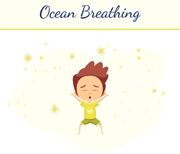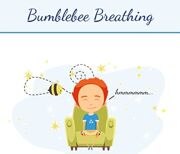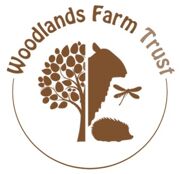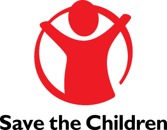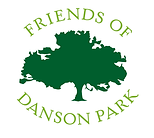- Home
- Our Learning
- Personal Development
Personal Development
At EWPA we foster a community of support for learning and personal development.
In line with this, our personal development curriculum and opportunities is underpinned by our vision of  .
.
By the end of our children's time at EWPA, all children will have developed their knowledge of who they are, their future aspirations and have a broad understanding of the ever-changing world around them. Our personal development curriculum has been designed with our school community at the forefront, developing our children and enabling them to grow their mindset, their knowledge, their character and their wellbeing.
We want all of our children to experience of wider opportunities that go beyond the curriculum. We have developed progressive, rich opportunities to develops our children’s personal, social and moral development as well as life skills they can use to be successful in future life.
We use the Jigsaw curriculum to underpin our children's personal development.




Mindset Knowledge Character Wellbeing
TKAT ACE
TKAT ACE is a trust wide strategy that ensures that every Pupil Premium child and their family has a TKAT trained adult champion. Through regular one-to-one contact with their TKAT ACE tutor children and their families build strong relationships and overcomes barriers to the child doing well in our school.

AT EWPA our ACE tutors carefully plan support and opportunities for our children to aspire and to develop the academic and life skills to enable them to aspire to bright futures and exceed their goals.
ACE tutors provide nurture and opportunities to receive pastoral care, and develop social and team building skills essential to ensuring they can achieve and thrive in all aspects of school life and beyond.
Whatever barriers children and families have to fully accessing learning and school life, the aim of the ACE programme is to minimise the impact of these, providing equity for all children in the school community.
Meet our ACE Team
 |  |  |  |
| Mrs Tuersley | Mrs Skinner | Mrs Sayers | Mrs Wellings |
Grow Your Mindset
‘Communication skills are at the heart of social interaction, participation, building relationships, making friends, and making sense of the human world around you.’ The Communication Trust (2015).
Oracy is a powerful tool for learning; by teaching our children to become more effective speakers and listeners we will empower them to better understand themselves, each other and the world around them. It is also a route to social mobility, empowering all students, not just some, to find their voice to succeed in school and life.
Through a high quality oracy education students learn through talk and to talk. This is when they develop and deepen their subject knowledge and understanding through talk in the classroom, which has been planned, designed, modelled, scaffolded and structured to enable them to learn the skills needed to talk effectively.
We use an oracy curriculum with deliberate, explicit and systematic teaching of oracy across phases and throughout the curriculum will support children and young people to make progress in the four strands of oracy outlined in the Oracy Framework.
In addition to this, we ensure that children have a variety of opportunities during their primary school jouney to take part in presentations and performances.
Growth Mindset
At EWPA, we know that children who have a positive attitude towards their learning will make good progress and be successful. Therefore, instilling a 'growth mindset' is a key priority of our school. We use the theories and research of Dr Carol Dweck to embed this philosophy within our school ethos.
We want all our children to be fearless of challenges, embrace their mistakes as part of the learning process, value the importance of effort, respond carefully to feedback and take inspiration from others. This will help them to achieve, not only with us, but also in their future lives as adults.
We are passionate about the of nurturing of a growth mindset culture at EWPA.
Encouraging children to become confident and resilient learners
GROW- your knowledge, your mindset, your character and your wellbeing. This is what we embed in all of our children here at EWPA. We know that for our children to fulfil their potential to become confident and resilient learners we, as a team of parents and staff, need to be modelling the mindset of a learner who is not afraid of making mistakes but who thrives upon them, knowing that this is all part of the learning process. The way in which we encourage children to learn and explore is vital to their success, not only at school but at home as well.
At EWPA, we consistently work to challenge and develop the attitudes of all children and staff towards learning, by considering what makes a successful learner.
Central to this attitude and approach to learning, are the theories and proven evidence of Growth Mindset. This is a term coined by psychologist Carol Dweck and her research has identified the characteristics of learners with a fixed and a growth mindset:

“The impact of early engagement can have a hugely positive impact on wider academic attainment, motivating and inspiring both children and their families, by helping them to see a future to which they can aspire and which feels achievable'. Robert Halfon MP & Chair of Education Select Committee.
We are focused on broadening our children's horizons and raising aspirations. We do this by giving chldren a wide range of experiences of the world including the world of work. It is about opening doors, showing children a wide range of possibilites open to them and helping to keep their options open for as long as possible.
We want to ensure that we are developing a range of attributes, skills and behaviours that can be encouraged from an early age of a child's live that will leave them in the best possible position as they begin their transitions to secondary school and on to future life.
We do this by focusing across the school on children's aspirations at key points across the year. We use these aspirations to form opportunities to invite in visitors and speakers from those areas. We also use these to review our curriculum to ensure that it is relevant to our children's needs.
We are delighted to be working with the Positive Footprints Network in delivering a program 'Raising Aspirations'. This primary school programme is all about raising aspirations and opening up the world of work. It shows children what careers are out there and the skills they’ll need to leave a positive footprint wherever they go in life.
It’s also about building their self-belief, their resilience, recognising their qualities and how they could be used in the workplace.
Please find the link to this program here.
Children will walk away from Residential experiences with memories that they will cherish and remember.
Residential trips enable our children to learn away from home and school. It provides children with the opportunity to grow in confidence, develop independence and build positive relationships.
In Year 5, our children have the opportunity to engage with a residential visit. For the majority of our children, this is their first experience of being away from home. The children experience a wide range of outdoor learning from climbing walls, through to canoeing.
We are now in the process of designing a progressive range of residential experiences to add to this offer. We are aiming to have these in place in 2025-26- watch this space!
Grow Your Knowledge
At EWPA, we make sure that our curriculum is underpinned with a rich variety of wider experiences to allow children to develop their knowledge further. These experiences are planned carefully and widen as the children progress through the school.
Below are trips and experiences that each year group may go on (although these may change year on year):
|
Nursery Visit to post office and post box Animal Experience Fairy Tale experience
|
Reception Local Area Walks Little Red Riding Hood Fairytale Experience Oxleas Woods adventure Danson Splash Park Woodlands Farm Visit Police/Fire visits |
|
Year 1 Visit to Welling High Street Maritime Museum Toy workshop Danson Park |
Year 2 Buckingham Palace Local Area Walks Kent Life - Florence NIghtingale Cinema |
|
Year 3 Lesness Abbey Stone Age experience Natural History Museum The British Museum Pizza Express |
Year 4 Greek Day Thames River walk Roman Day Science Museum |
|
Year 5 British Museum Orienteering in EW Open Space Place of worship African Drumming workshop |
Year 6 The Clink Prison Museum Theatre trip Cinema Super Summer events - a program of trips and visits following SAT's. |
We are pleased to be able to offer our children a broad range of extra curricular clubs. We have listened to our children's views and interests and used these to build our offer.
We have a number of clubs that are run by outside providers, alongside school led clubs. Our school run clubs are provided on a half termly basis. Some clubs are run at lunchtime and others after school. Club offers are published to parents and children every half term ahead of sign up. Children's take up of clubs is tracked, staff use this information to ensure that all children access at least one club per year. Our ACE tutors play a key role in this process.
Regular pupil voice is collected to ensure that clubs are relevant and of interest to our children.
See below for our 2024-25 Club offer:
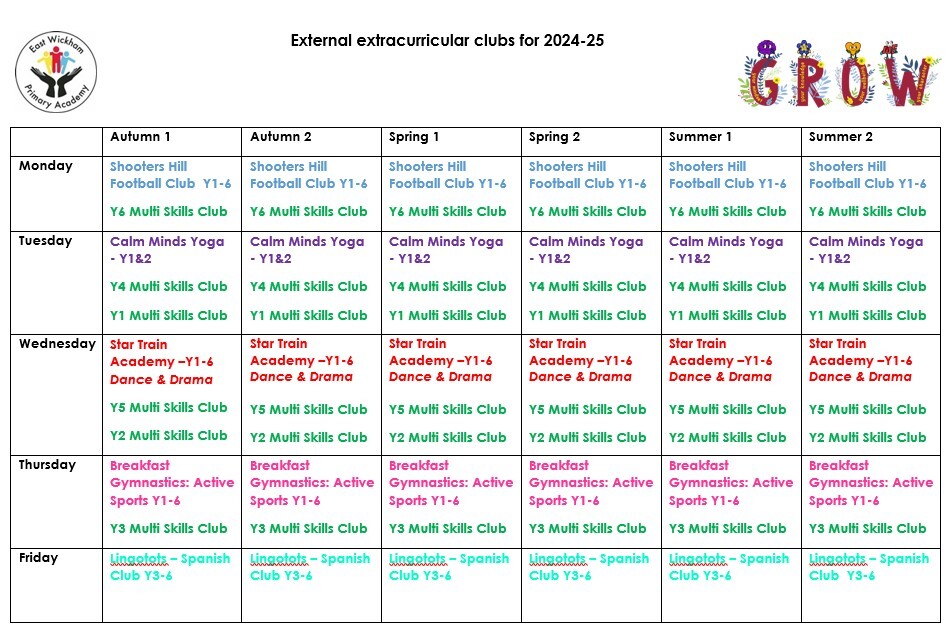
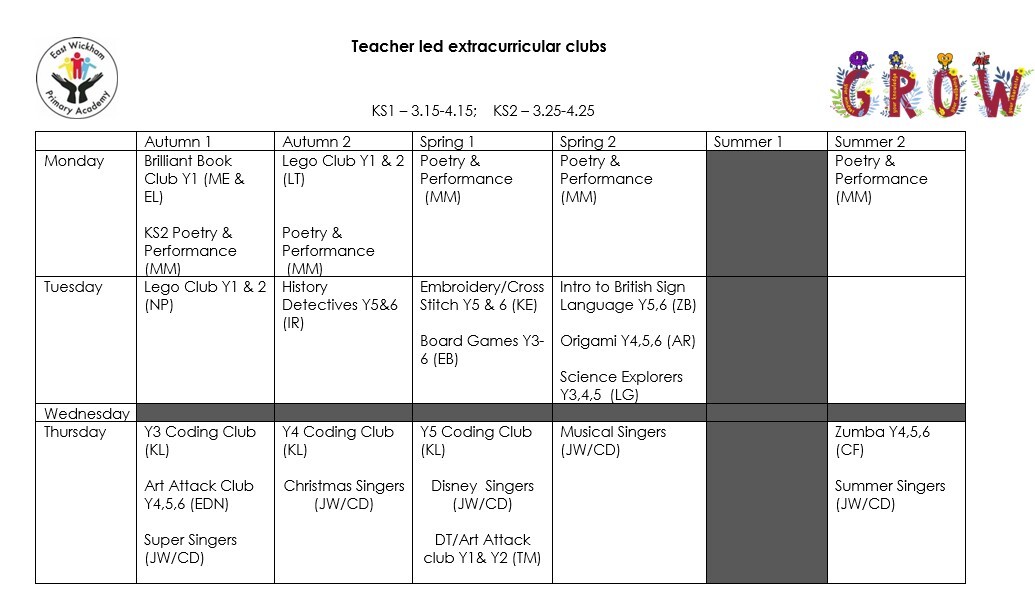
Grow Your Character
At EWPA we want all of our children to develop leadership skills in a variety of contexts. We want to give children responsibilities to lead, to help shape the school and their experience and to develop aspiration for future leadership in their next stage of learning and eventual careers.
Our leadership opportunities are progressive and begin from the EYFS upwards.
EWPA Leadership Opportunities
|
EYFS Classroom responsibilities - Helping Hands Attendance Amabassadors |
Key Stage 1 - Y1 & Y2 Playground Buddies Attendance Ambassadors Environment Caretakers Reader Leaders |
|
Lower Key Stage 2 - Y3 & 4 Attendance Ambassadors Environment Caretakers Sports Leaders Language Leaders Reader Leaders |
Upper Key Stage 2 - Y5 &6 Attendance Ambassadors Children's Leadership Team Team Leaders Safeguarding Ambassadors Library Leaders |
In addition to the leadership responsibilities, every child in our school are considered to be Agents of Change. Every term a school project is introduced to the whole school. These projects are chosen based on pupil voice. Children who would like to be part of the project can apply and present their application to their classes. Children vote for the classmate that they believe have the passion and skills to complete the project of the term. Each of the projects are completed with the elected children and the Children's Leadership Team. Different members of staff take the lead on each project.
For 2024-25 the following projects have been selected:
| Term | Project | Member of Staff Leading Project |
| Autumn Term | Road Safety around our school |
Mrs Rust Mrs Sayers Mrs Payton |
| Spring Term | Happy Playtimes |
Mrs Boardman Miss Evans Mrs Tuersley Mrs Wellings Mrs Skinner |
| Summer Term | Looking after our world |
Mrs Gray Mrs Lewis |
At EWPA we are proud to support a number of charities across the school. The charities are chosen carefully for each year group. During the year, the chlidren learn about the charity and the support it provides. Children work together to decide on how they are going to fund raise for their chosen charity. Parents, Carers and the wider community are invited to support the children with their fund raising efforts.
At the end of each fund raising event, the proceeds are presented to each of the charities.
Over the course of the children's time at EWPA, they will learn about 6 charities and the work that they carry out.
EWPA Charities
|
EYFS
|
Year 1
|
Year 2
|
|
Year 3
|
Year 4
|
Year 5
|
|
Year 6 |
Grow Your Wellbeing
“Children’s lives are now far more stressful than in the past, alongside higher academic expectations, there are pressures created by social media use, which can monopolise children’s time and attention, affect their body image, or expose them to age-inappropriate content. Many children are under more time pressure, more peer pressure and more pressure to succeed. Getting outdoors is the cheapest and easiest way to reduce this pressure so children (and adults) feel less stressed.” Muddy Hands Report
We are incredibly fortunate to have amazing school grounds. We prioritise outdoor learning experiences both to support children's curriculum knowledge, but also to develop our children's wellbeing.
Learning without walls gives our children time and space to explore within the natural environment. There is much research available that shows time spent in nature can improve children’s mental health and wellbeing. Likewise, a lack of learning outdoors is steadily resulting in a ‘Nature Deficit Disorder’, where spending less time outside is suggested to lead to behavioural problems. By taking learning outdoors, we can combat Nature Deficit Disorder and increase mental health by improving mood, confidence and wellbeing.
We have a forest area that is used to deliver an outdoor curriculum from Nursery upwards.
At EWPA we believe in teaching our children tools that will help them as they grow and develop.
In our daily lives, our breathing frequently reflects our state of mind. Each thought and feeling expresses itself in the form of relaxation or tension, peace or worry, receptiveness or fear, and triggers a biochemical reaction in the body.
If you are experiencing turmoil, your breathing becomes shallow, rapid and irregular. We can use breathing techniques to bring about a calm mind. Children can use breathing techniques to deal with anxiety, anger and tension. They can be taught how to apply an awareness of breath to stressful situations such as dealing with exams and tests, conflicts or being bullied, as well as before performing or presenting to their peers and parents.
Breathing techniques can also help children to create a space into which they can come to understand their own emotions such as anxiety, anger or worry, and the physiological responses that these emotions manifest in their bodies such as tummy aches, headaches and fatigue.
We work to develop a toolkit of breathing strategies by building in regular 'breathe breaks' during the school day.


